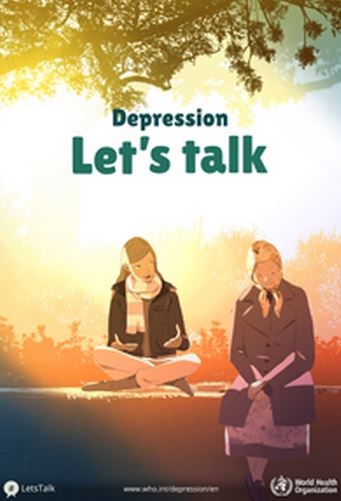
06 Apr 2017
World Health Day supported by Leeds as international campaign against depression is backed
In the lead-up to World Health Day on 7 April, latest estimates from the World Health Organisation (WHO), suggest over 300 million people are now living with depression. Depression is the leading cause of ill health and disability worldwide. In Leeds one in four of us, around 190,000 people, will experience mental health issues.
Leeds City Council is backing the WHO campaign to raise awareness of the need for support for people with poor mental health, tackling stigma, and improving access to help people need to live healthy, productive lives.
World Health Day is a focus for WHO’s year-long campaign “Depression: let’s talk” which has a goal of more people with depression both seeking and getting help.
Rebecca Charlwood, Chair of Leeds Health and Wellbeing Board and Leeds City Council’s executive member for adults, health and wellbeing, said:
“It is important not to take your emotional health for granted. Our wellbeing can be affected by a range of life events, and we can all go through periods when we feel unable to cope. Leeds is making great efforts to make sure people with depression and other mental health issues are getting the support they need. We have committed as part of our health and wellbeing strategy to making sure mental health is treated as importantly as physical health and partners across the city are working hard to make this a reality.
“The MindWell website is the single 'go to' online source for information about mental health in Leeds. It provides a portal for anyone living or working in Leeds wanting quick and easy access to up-to-date information. Mindmate offers more targeted support for younger people and is recognised as a great resource.”
Dr Jane Mischenko, Lead Commissioner for Children and Maternity Services, Leeds South and East Clinical Commissioning Group, said:
“When we’re in good emotional and mental health, we can cope with stresses of everyday life, fulfil our potential, and feel good or okay about life and ourselves most of the time. Obviously our ‘social’ life can really affect our emotional and mental health - things like our family, friends, and the situations we experience in everyday life.
“Children all experience difficult times and feelings like anger, anxiety, sadness at some point which is normal. Learning how to cope with this and behave appropriately in response is a normal part of growing up. But when a child or young person feels unable to cope with everyday life, rarely feels okay about life and themselves, and can’t fulfil their potential, they need extra support. There’s help from available online, and Mindmate is a great resource. Telling people you can trust is really important and seeking help from your doctor is also an important way to get the help you need.”
Because there are strong links between depression and other non-communicable disorders and diseases, . including increased risk of substance misuse disorders and diseases such as diabetes and heart disease it is important to recognise the links between physical and mental health. Depression is also an important risk factor for suicide, and Leeds is recognised for the quality of the city’s suicide prevention work.
Depression is a common mental illness characterised by persistent sadness and a loss of interest in activities people normally enjoy, accompanied by an inability to carry out daily activities, for two weeks or longer.
People with depression also normally experience several of the following:
- a loss of energy;
- a change in appetite;
- sleeping more or less;
- anxiety;
- reduced concentration;
- indecisiveness;
- restlessness;
- feelings of worthlessness,
- guilt, or hopelessness; and
- thoughts of self-harm or suicide.
If you want more information about the WHO campaign you can visit: http://www.who.int/campaigns/world-health-day/2017/en/
For more information about services and advice available in Leeds, visit: http://www.oneyouleeds.org.uk/pages/mental-health
https://www.mindwell-leeds.org.uk/
Details of the Leeds suicide prevention support and linked information are at: http://www.leeds.gov.uk/phrc/Pages/Suicide-Prevention.aspx
For media enquiries contact:
Leeds City Council Communications team
communicationsteam@leeds.gov.uk